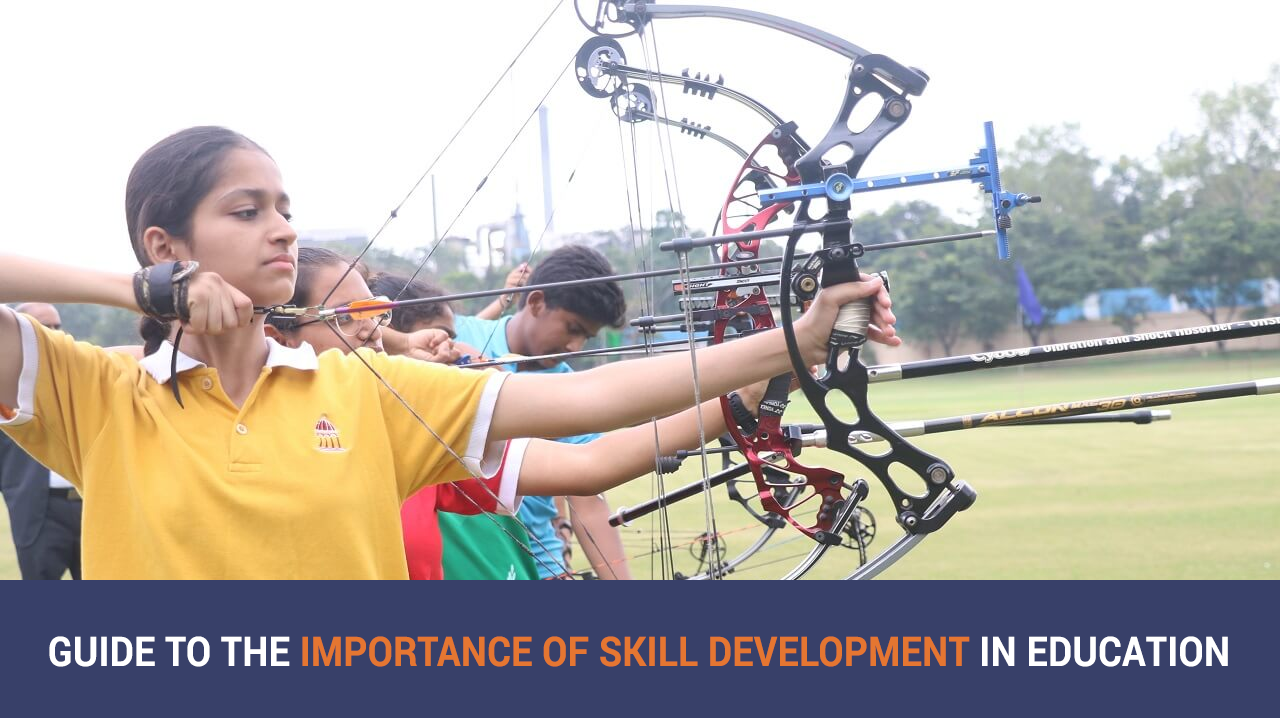Importance of Skill Development in Education

Introduction
The idea of skill development has become increasingly popular in the dynamic world of contemporary education as a means of launching pupils beyond the confines of traditional academic learning. Although traditional education undoubtedly gives students a plethora of information, skill growth equips them with real-world proficiencies and talents that are essential for succeeding in today’s complicated environment.
There is much more to education than just reading textbooks and attending lectures. It acts as a link between academic understanding and practical implementation. The importance of developing students’ talents in the classroom cannot be overstated. It equips pupils with the skills necessary for overcoming problems, navigating hurdles, and successfully understanding the material. Collaboration, effective communication, problem-solving ability, and digital literacy are now considered fundamental skills for both personal and professional growth. In-depth discussions of the particular high-demand talents, an examination of the many facets of skill enhancement, and an explanation of the mutually beneficial link between schooling and the acquisition of practical proficiencies are all covered in this guide.
How Do You Develop Your Skills?
Skill development is the process of acquiring new knowledge and honing existing abilities in a given industry. It is essential to learn, practice, get feedback, adapt to change, solve issues, communicate well, manage your time well, and be persistent. This procedure is crucial for growing personally, making professional progress, and staying current in a quick-paced atmosphere. It comprises practice, formal education, and keeping up with current information. Developing new skills, polishing current ones via experience, and maintaining motivation are essential elements. People may overcome challenges, improve their proficiency, and succeed in several areas of life by honing their abilities.
What Does Education Mean by Skill Development?
Education for skilling involves the process of expansion, which helps students become more employable and prepares them for lifelong learning. Students require practical skills in addition to academic knowledge to deal with the demands of the contemporary work environment. These skills may fall under a variety of categories, including cognitive, social, emotional, and practical skills. The development of skills is a crucial component of education because it equips people with the resources they need to deal with issues in life and be successful in several fields.
Key elements of educational skill development include
1.Cognitive Skills: These include thinking, problem-solving, and critical analysis. Developing cognitive skills helps people understand information, make wise decisions, and adapt to new situations.
2.Communication Skills: Effective communication skills are crucial in both personal and professional situations. This calls for the ability to communicate ideas, listen intently, and communicate both orally and in writing.
3.Innovation and creativity: People who are encouraged to be creative are better equipped to think creatively, develop original ideas, and find innovative solutions to problems.
4.Social and emotional skills: These involve identifying and managing emotions, forging wholesome bonds, and collaborating with others. They are necessary for both effective individual and group functioning.
5.Digital literacy: In today’s digital age, understanding technology and online platforms is essential. Understanding how to use digital tools, being aware of online safety, and responding to quickly evolving technology.
Importance of Skill Development in Student Life
1.Enhanced Employability: Students who have relevant skills are more appealing to employers, providing them an advantage in the employment market.
2.Critical Thinking: The development of skills encourages critical thinking, empowering pupils to assess situations and arrive at wise judgments.
3.Adaptability: In the ever-evolving world of today, flexibility is essential. Students can adapt to new technology and changing sectors with the support of skill development.
4.Confidence Boost: Gaining proficiency in skills gives pupils more self-assurance, which motivates them to approach new difficulties with a positive outlook.
5.Life Skills: Essential life skills like time management, financial literacy, and effective communication are taught through skill advancements.
6.Entrepreneurial Spirit: Fostering abilities may stoke an entrepreneurial spirit and encourage pupils to innovate and create new possibilities.
Soft Skills: The Foundation of Success
1.Communication Skills: It’s important to be able to communicate effectively in all aspects of life. Students’ capacity to communicate ideas clearly and listen intently is improved via skill evolution.
2.Leadership and Teamwork: Students who learn these skills are better prepared to operate in diverse teams, a necessary skill in today’s business.
3.Creativity and Innovation: Students can think creatively and innovatively in a variety of sectors thanks to skill growth.
4.Problem-Solving: Teaching kids problem-solving techniques gives them the confidence to overcome obstacles, a talent that is useful in any field.
Skill Development in Education Systems
1.Integrating Skills in Curricula: Schools should include the skill of education for expansion in their curricula to provide students exposure to both theoretical and practical knowledge.
2.Extracurricular Activities: Extracurriculars offer a great setting for developing skills. Schools must provide a variety of activities that accommodate all ability levels.
3.Teachers’ Role: Teachers are essential to the development of skills. They should help students discover their talents, support them in their endeavors, and mentor them as they hone their abilities.
How Can Parents Help in Their Child’s Skill Development
1.Encouragement: Parents should inspire their kids to pursue a variety of passions and interests.
2.Support: Providing tools and assistance for activities that develop skills, like music lessons or coding classes, may have a big impact.
3.Balanced Approach: A child’s growth trajectory is ensured by balancing academic achievement with skill growth.
4.Setting Examples: Parents should lead by example by pursuing lifelong learning and continuously improving their talents.
5.Effective Communication: Parents may better grasp their children’s objectives by staying in constant contact with them. This allows them to give pertinent advice.
Conclusion
Education that focuses on skills enhancement is essential to succeed in the contemporary world. One organization stands out as a beacon of brilliance in the quest to comprehend the fundamental importance of skill evolution in education: MIT Gurukul. The school’s seamless integration of skill development into its curriculum has transformed the idea of education. This institution recognizes that education goes beyond theoretical knowledge and literature.
Instead, it equips students with a wide variety of abilities that are essential for success in the fast-paced world of today.
The dedication of MIT Gurukul to prepare students for the real world is what makes it stand out. The institution gives students the tools they need to become self-assured, flexible, and inventive people by boosting their employability and giving them lifetime learning skills.
MIT Gurukul gives students the best setting to develop both technical and soft skills by providing a well-rounded curriculum, extracurricular activities, and a growth-promoting environment. Students set out on a transformational path that aims to mold them into accomplished, empowered, and knowledgeable people equipped to face the difficulties of the modern world.

